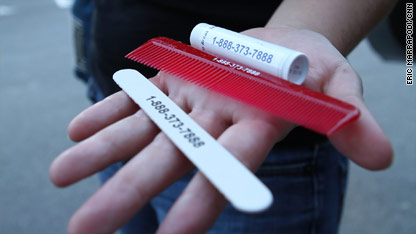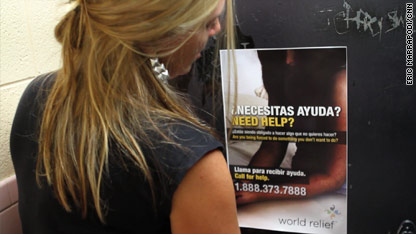Greensboro, North Carolina (CNN) —The truck-stop hooker is no Julia Roberts, the trucker in the cab with her no Richard Gere, and this truck stop off the highway could not be any farther from Beverly Hills, the staging ground for “Pretty Woman.”
The woman sports baggy shorts, a white T-shirt and frizzy hair. Her fat middle-aged pimp sits in a beat up red Honda, watching as his “lot lizard” moves from truck to truck, in broad daylight. If this pimp has a cane it is for substance, not style.
She moves through the parking lot, occasionally opening a cab’s passenger-side door and climbing in.
The trucker and hooker disappear in the back for 10 minutes.
Danielle Mitchell watches from the other end of the parking lot and shakes her head.
“We know from talking to other victims and other agencies that girls are taken to truck stops and they’re actually traded,” she says, sitting in her car, a shiny silver sport utility vehicle, keeping a healthy 50-yard distance from the pimp.
CNN's Belief Blog – all the faith angles to the day's top stories
Mitchell is North Carolina human trafficking manager for World Relief. World Relief is a Christian nonprofit attached to the National Association of Evangelicals and is best known for its efforts to combat global hunger and respond to disasters around the world.
Mitchell is trying to tackle a disaster in her home state. And she is not alone.
Motivated in large part by their religious traditions of protecting the vulnerable and serving “the least of these,” as Jesus instructed his followers to do in the Gospel of Matthew, World Relief and other Christian agencies like the Salvation Army are stepping up efforts and working with law enforcement to stem the flow of human trafficking, which includes sex trafficking and labor trafficking.
“Jesus didn’t just go around telling people about himself. He also healed the blind and healed the brokenhearted, he freed captives, and I think that it would be ridiculous to walk up to someone who is hurting and tell them, ‘Let me tell you about the Gospel,’ and then walk away while they’re still hurting,” Mitchell says.
In North Carolina, the result of those efforts can be seen in the number of victims of human trafficking being referred to World Relief for services, up 700% in 2011, Mitchell says.
“It’s not that North Carolina is all of a sudden trafficking more people,” Mitchell says. “It’s that we know what to look for and we’re actually identifying and rescuing them.”
Truck stops and sweet potatoes
North Carolina’s rich soil makes it an agricultural hub. It produces more sweet potatoes than anywhere else in the country. The state acts as a crossroads for three major interstate highways. The mix of accessibility and low-paying farm jobs make a good working environment for traffickers, Mitchell says.
This truck stop is the type you think twice about. It’s grimy and run down.
How badly do I really have to use the bathroom? I bet I could hold out for another 12 miles. That kind of place.
Mitchell walks in and politely asks the women behind the register if they have tape.
“Over there, honey,” the cashier says, pointing to a dimly lit portion of the store.
After paying for a roll of industrial packing tape, she tucks it in her purse and heads for the restroom.
In a stall on the far end, she shuts the door behind her and pulls out the tape and a poster with words in English and Spanish.
“Need help?” the poster asks. “Are you being forced to do something you don’t want to do?” There’s a toll free number, 888-373-7888, for the National Human Trafficking Hotline, run by the nonprofit Polaris Project.
More on the fight against modern-day slavery at the CNN Freedom Project
“A lot of times when girls are being trafficked they’re being controlled,” Mitchell says. “They’re often not allowed to get very far from their trafficker. And we’ve found one of the very few times girls are alone is when they’re in the bathroom.”
She used to ask if she could hang posters in truck stop restrooms. Now she just hangs them.
That toll free hot line number is plastered on combs, lip balms and nail files that Mitchell and other anti-trafficking workers can slip discreetly to men and women they suspect might be victims. Slipping a potential client an anti-trafficking business card could be dangerous, even deadly, they say.

A comb, nail file and lip balm feature the number for the National Human Trafficking Hotline.
But it’s not the only way Mitchell gets in touch with victims. Law enforcement is reaching out to her more and more.
When North Carolina law enforcement breaks up a trafficking ring, they call her.
She helps the victims get safe places to live, food and job training, along with just being a conversation partner.
Since 2010, North Carolina has had a statewide coalition to fight human trafficking. Law enforcement officers are now trained in what to look for. The program includes rapid response teams made up of representatives from law enforcement, service providers, hospitals and charities. When a potential victim comes into a hospital or is discovered through an arrest, the team springs into action.
“Victims are not going to self-identify,” says Mitchell, who has since left World Relief and is considering going back to school after a lack of funding threatened to cut her hours to part time. “ They’re not going to say ‘I’m a victim of human trafficking.’ So the burden is really on the service providers and law enforcement and the community."
In North Carolina, the partnerships between those groups, she says, “have helped to rescue victims.”
Church and state in an unlikely coalition
Christian groups working to combat trafficking are providing law enforcement with some much-needed relief.
“Because of the limitations of our work, we like to partner with organizations that can provide services,” says Kory Williford, a victim specialist with the FBI based in North Carolina.
“Human trafficking isn’t the only victim population we work with, so to have organizations who can provide care to our victims on a longer term basis than we are able to is huge,” she says.
“A lot of sex trafficking is occurring in this state” and labor trafficking is on the upswing, Williford says.
The FBI in North Carolina has been partnering with World Relief for several years.
Assistant U.S. Attorney Anand P. Ramaswamy, who focuses on human trafficking cases across the state from the federal prosecutors office in Greensboro, says he has been collaborating with local law enforcement on human trafficking.
“Those kind of cases have only recently been on the uptick,” he says. “As officers become more trained in what to look for, the number of cases goes up.”
The nation and the state are still working to catch up with the reality of trafficking, he says.
“Sometimes the victim was treated as part of the problem,” he says. “In one instance a 16-year-old girl was charged with prostitution by local authorities. So we have to go and sort of undo that. That’s also the case where the person may have done something wrong, so they’re reluctant to come forward.”
Ramaswamy is keenly aware that his office and religious groups do not always have the same interests. His is in upholding and enforcing the law, while religious groups are interested in practicing their religion.
But the assistant U.S. attorney still believes in the partnership between church and state.
“On one hand the fact they’re a religious organization is not directly relevant,” he says. “However, if you look at the history of the abolitionist movement, it has always been religious communities and those are the people who are concerned enough to be active in it.
“And today with modern-day slavery the same is the case.”
The new Underground Railroad
Westover Church in Greensboro, North Carolina, is imagining what fighting modern-day slavery could look like. The nondenominational suburban church is cut from an evangelical cloth and has 5,000 members and a sprawling campus.
In 2011, the church started a ministry called “Abolition!” to fight human trafficking. It focuses on prayer, awareness and resources.
“In truth we didn’t know what we were going to do. We just knew we had a really strong passion for it,” says Dianne Stone, an "Abolition!" member. “We didn’t want to be a group that got together and said, ‘Oh we feel so bad for this.’ We wanted to do something and we wanted to make a difference.”
In a bright room off the sanctuary, Stone, Cambre Weller and Jennifer Craver, all members the group, explain why they got involved. They seem unlikely fighters against trafficking.
They could easily pass for a women’s Bible study group as they casually chat about their children and church activities before turning their attention to trafficking concerns in their area.
“It’s another thing to realize this is in your backyard and that’s our responsibility to address that and protect those who are being exploited,” Craver says.
What's the role of faith in fighting slavery?
Craver says the things they have learned about trafficking are horrible and keep her up at night. “I don’t want to know about trafficking, but I do know about it and as a Christian, I feel like I have to respond to that,” she says. “That is part of my calling.”
The group screens documentaries about human trafficking at other churches and sends out speakers to the Christian circuit. They also prepare emergency bags: canvas totes with a comb, brush, journal, pajamas, clean towels and other basics they learned that most trafficked women don’t have.
They keep a ready stash of bags for World Relief to distribute to victims, particularly those who are rescued during raids.
Mitchell says her faith has played a large role in her work to help victims of trafficking. “I don’t think I’m any different than anyone I work with, in vulnerability or dignity,” she says. “And man, I really believe that Christ saw everyone equally.”

Danielle Mitchell views her faith as integral to her work in fighting human trafficking.
“I could have been born in a brothel in India,” she says.
But there is a limit to how much personal faith she shares with clients.
“We’re completely client centered,” she says. “That means we’re not going to force our faith on anyone. And I don’t talk to the clients about what I believe, unless they ask me.”
“If a client asks me and they want to go to a Buddhist temple, then I’m going to take them because that’s what they want.”
Prostituted not prostitute
Back at the truck stop, Mitchell explains that she hates the term “prostitute” and despises the phrase “lot lizard.” She says it strips people of their dignity.
Instead, she refers to a “woman or man who is being prostituted.” It is a slight change in wording that reveals a starkly different viewpoint.
“A lot of people think of sex trafficking or prostitution, they think it’s glamorous and that you can pinpoint someone who is selling sex or being sold for sex,” she says. “Usually it’s just average people who maybe aren’t taking care of themselves."
The prostitute, or woman being prostituted, or potential human trafficking victim, gets back into the beat up red Honda with the overweight pimp, who drives off, maybe after catching a glimpse of a journalist and activist watching them from a safe distance.
Mitchell calls the police to report what she just saw.
A few hours later, they call back and say the alleged pimp and alleged prostitute are long gone.


No comments:
Post a Comment